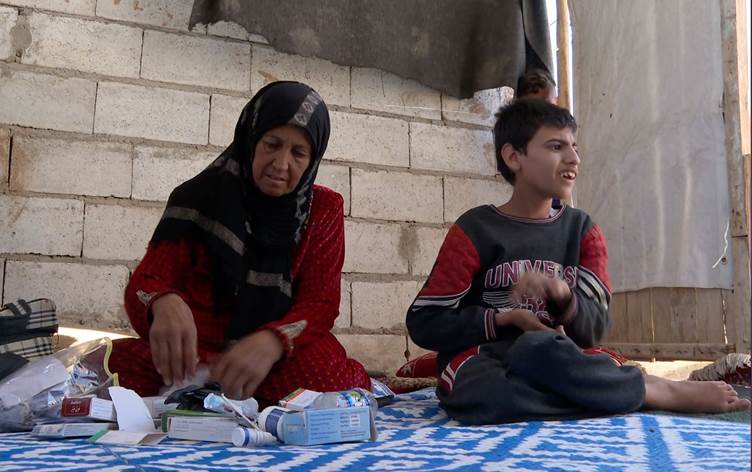WASHOKANI CAMP, Syria — Residents of Washokani camp in Syria's Hasaka province are suffering from medicine shortages amid a lack of aid from the UN and international aid groups.
Emira Obed is a mother-of-six from the village of Leylan in Sari Kani (Ras al-Ain). As a result of her chronic kidney disease, Obed has had to sell food she receives from the camp to pay for the medication she requires twice a week to clean her kidneys.
"I sell the food they give me at the camp to afford to buy medicine, which amounts to 50,000 pounds a week. I spend it to wash both my kidneys twice a week," Emira Obed told Rudaw on Monday.
"My kidneys hurt," she lamented. "I have cysts in my kidneys. We're in a miserable situation.”
The camp administration says since the camp has not been recognized by the UN, the World Health Organization (WHO) does not give them medicine. Therefore, IDPs are forced to buy medicines on their own.
In a bid to ease the burden on the IDPs and locals, the Kurdish Red Crescent has recently deployed a number of medical teams to areas in northeast Syria (Rojava) that do not have hospitals, with cases of diarrhea on the rise due to the rising temperatures and unclean drinking water.
The organization has launched an awareness campaign and deployed medical teams to several areas, especially remote villages and IDP camps, testing people and providing treatment.
Turkey's invasion of Sari Kani and Gire Spi (Tal Abyad) in 2019 with the help of Syrian opposition groups including the Free Syrian Army displaced tens of thousands of locals.
Translation by Zhelwan Zyad Wali
Video editing by Sarkawt Mohammed








Comments
Rudaw moderates all comments submitted on our website. We welcome comments which are relevant to the article and encourage further discussion about the issues that matter to you. We also welcome constructive criticism about Rudaw.
To be approved for publication, however, your comments must meet our community guidelines.
We will not tolerate the following: profanity, threats, personal attacks, vulgarity, abuse (such as sexism, racism, homophobia or xenophobia), or commercial or personal promotion.
Comments that do not meet our guidelines will be rejected. Comments are not edited – they are either approved or rejected.
Post a comment